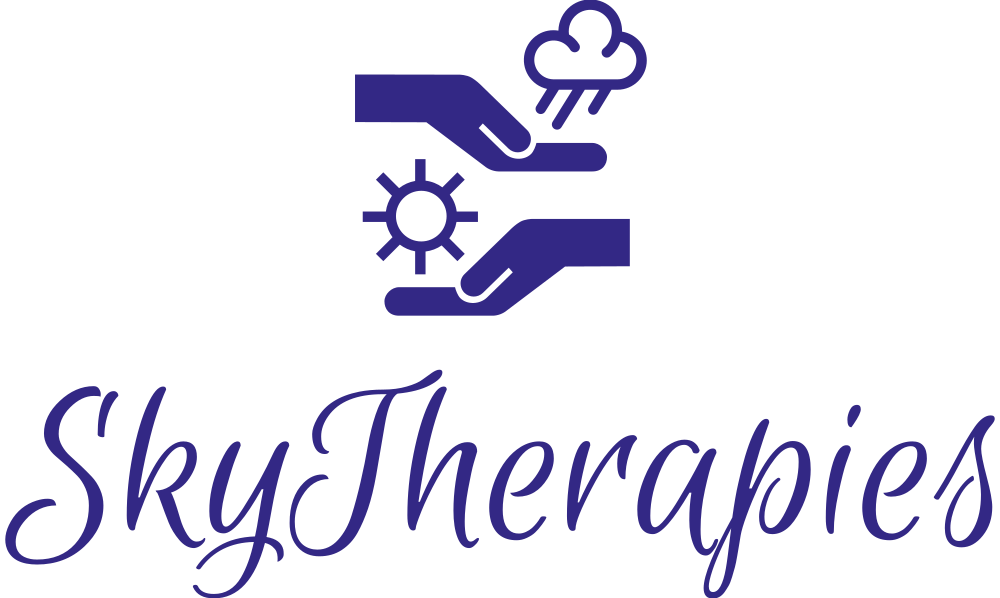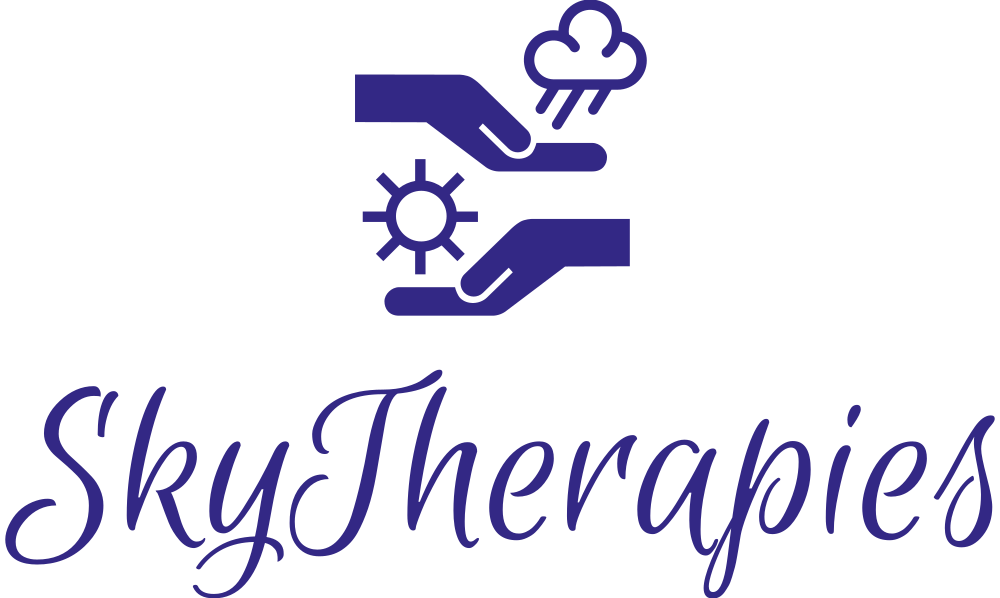In today’s fast-paced world, stress and anxiety have become common culprits in disrupting our lives. Among their many negative effects, one of the most challenging is their impact on sleep. The inability to unwind at night, racing thoughts, and a restless mind can quickly lead to sleepless nights and a constant feeling of fatigue. As the cycle continues, stress and anxiety worsen, sleep becomes even more elusive, and the toll it takes on our physical and mental well-being becomes more apparent.
If you find yourself caught in this unrelenting cycle, it’s important to understand that you’re not alone—and there is a way out. At Sky Therapies, we specialize in helping individuals break the cycle of stress, anxiety, and sleeplessness using holistic, mind-body therapies that restore balance and promote restful sleep.
In this blog, we will explore how stress and anxiety interfere with sleep, the harmful effects of disrupted sleep on your overall well-being, and most importantly, how mind-body therapies like Deep Brain Reorienting (DBR), EMDR, and Brainspotting can help you restore balance and reclaim restful, rejuvenating sleep.
How Stress and Anxiety Affect Sleep
To understand the connection between stress, anxiety, and sleep, it’s important to look at how these emotions affect our bodies. When we experience stress or anxiety, our bodies go into “fight or flight” mode. This evolutionary response is meant to help us handle immediate dangers—raising our heart rate, releasing adrenaline, and preparing us to face threats. While this response is helpful in short bursts, constant stress keeps the body in this heightened state, which is not conducive to relaxation or rest.
When anxiety or stress continues throughout the day, it often spills into the night. Your mind races with worries, concerns, and unresolved emotions, making it nearly impossible to unwind. Sleep becomes elusive as your body and mind are still in alert mode, even as you try to rest.
The Cycle of Stress, Anxiety, and Sleep Disruption
The vicious cycle of stress and anxiety interfering with sleep is not just uncomfortable; it can be damaging to your health. Lack of sleep affects both your physical and mental well-being, leading to:
- Increased Stress Levels: Sleep deprivation only increases stress and anxiety, making it harder to manage emotions and navigate daily challenges.
- Reduced Cognitive Function: Poor sleep impairs your memory, concentration, and decision-making skills, leading to frustration and even more stress.
- Emotional Instability: Lack of sleep can exacerbate feelings of irritability, sadness, or anxiety, making it harder to cope with stressors.
- Physical Health Issues: Chronic sleep deprivation can lead to a host of physical health problems, including weakened immunity, weight gain, and heart disease.
If you’re stuck in this cycle, it can feel as though rest is always out of reach, no matter how hard you try. However, there are practical steps and therapeutic approaches that can help break the cycle and restore your ability to relax and sleep peacefully.
How Mind-Body Therapies Can Help Break the Cycle
While traditional methods of managing stress and anxiety, such as relaxation techniques and medication, can be helpful, mind-body therapies offer a deeper and more sustainable solution. These therapies address the root causes of stress and anxiety, guiding you toward a state of balance and calm that promotes restorative sleep. At Sky Therapies, we offer a range of mind-body therapies that can help you heal both physically and emotionally, breaking the cycle of stress and sleep deprivation.
-
1. Deep Brain Reorienting (DBR): Rewiring the Brain for Calm
DBR is an integrative therapy that focuses on reconnecting the brain and body to create lasting relief from stress, anxiety, and trauma. By working directly with the brain’s natural healing mechanisms, DBR helps to “reorient” the way your brain processes emotions and stress. It promotes relaxation by accessing areas of the brain that are responsible for emotional regulation and the body’s stress response.
DBR is especially effective for individuals who experience anxiety and stress at high levels. By working with your brain to shift its patterns, DBR can help reduce the intensity of stress responses, allowing you to access deeper levels of calm. As you work through your emotions with DBR, your body learns how to release stored tension and emotional blocks, making it easier to relax at night and fall into a peaceful sleep.
-
2. EMDR (Eye Movement Desensitization and Reprocessing): Healing the Nervous System
EMDR is a powerful therapy that helps individuals process and heal from trauma and anxiety by reprogramming the brain’s responses to emotional triggers. When you experience stress or anxiety, your brain stores these feelings as emotional memories, and over time, they can become overwhelming and unmanageable.
Through EMDR, we help clients process these emotional memories by using bilateral stimulation (usually eye movements) to access the brain’s natural processing mechanisms. This allows the brain to “reprocess” the stress and anxiety stored in the nervous system, reducing their emotional charge and enabling you to manage stress more effectively.
By releasing stored anxiety and trauma, EMDR helps you regain control over your emotions and prevent them from interfering with your ability to sleep. As your stress levels decrease, you’ll find it easier to relax, unwind, and get the restful sleep you need.
-
3. Brainspotting: A Somatic Approach to Anxiety and Sleep
Brainspotting is another therapeutic modality that works with the brain and body to release emotional tension and trauma. The technique is based on the idea that where we look affects how we feel. By identifying “brainspots”—specific points in the visual field that correspond to emotional pain or stress—Brainspotting helps individuals access and release trapped emotions, promoting deep healing.
Unlike traditional therapies, Brainspotting works at a somatic level, helping to release physical tension that may be keeping your mind and body in a heightened state of stress. By processing these emotions, Brainspotting enables your body to relax, making it easier to fall asleep and stay asleep. The therapy helps you reconnect to your body, build emotional resilience, and break free from the patterns of stress and anxiety that have been affecting your sleep.
-
4. Mind-Body Connection: Relaxation and Somatic Awareness
In addition to these therapeutic modalities, we also emphasize the importance of cultivating a deeper mind-body connection. Simple practices like breathing exercises, progressive muscle relaxation, and body scans can help reduce the physical tension that often accompanies anxiety and stress. These practices allow you to reconnect with your body and create a sense of calm that facilitates sleep.
Mind-body therapies help you become more aware of how stress manifests in your body, giving you the tools to release tension and restore balance. With practice, these techniques can become an essential part of your routine, helping you to manage stress more effectively and sleep more soundly.
Practical Strategies for Restful Sleep
In addition to mind-body therapies, there are practical steps you can take to improve your sleep hygiene and break the cycle of stress and anxiety. Consider these strategies to promote better sleep:
- Create a Consistent Sleep Schedule: Try to go to bed and wake up at the same time every day to regulate your body’s internal clock.
- Limit Stimulants: Avoid caffeine, alcohol, and heavy meals close to bedtime, as these can disrupt your ability to relax and fall asleep.
- Create a Relaxing Bedtime Routine: Engage in calming activities like reading, taking a warm bath, or practicing mindfulness before bed.
- Limit Screen Time: The blue light emitted by phones and computers can interfere with the production of melatonin, a hormone essential for sleep.
- Optimize Your Sleep Environment: Make your bedroom a sanctuary for rest. Keep it dark, quiet, and cool, and invest in a comfortable mattress and pillows.
How Sky Therapies Can Help
At Sky Therapies, we offer a holistic approach to stress and sleep disruption. Whether you are struggling with anxiety, chronic stress, or sleep deprivation, our therapeutic techniques are designed to help you break the cycle and restore balance to your body and mind.
Through DBR, EMDR, Brainspotting, and other mind-body therapies, we can help you release emotional blocks, reduce stress, and improve your ability to relax and sleep deeply. Our compassionate therapists are here to guide you on your healing journey, providing the tools and support you need to reclaim restful sleep and emotional well-being.
Moving Forward
Stress and anxiety don’t have to control your sleep or your life. With the right tools, support, and mind-body therapies, you can break the cycle of sleeplessness and create lasting healing. At Sky Therapies, we are dedicated to helping you find the peace and rest you deserve. If you’re ready to take control of your stress and sleep, reach out to us today to learn more about how we can help you reclaim your nights and your well-being.





